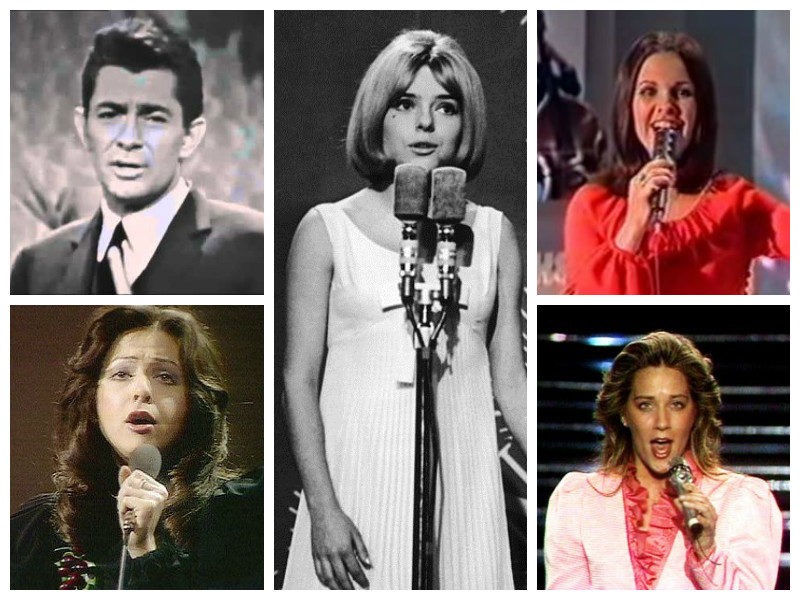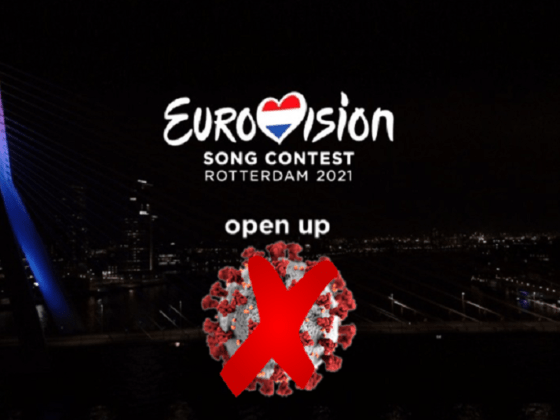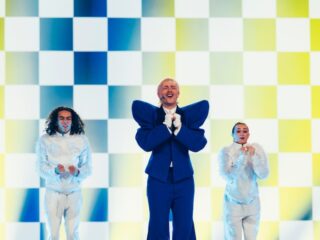News about Eurovision 2021 isn’t exactly coming thick and fast. So we’re using the time to finalise our series of 10 reasons we love countries that participated in Eurovision….but sadly left it behind. We started our series with Turkey and we’re ending it with Luxembourg — the glorious nation that withdrew from the contest more than 25 years ago — in 1994.
Despite its size, Luxembourg certainly packed a punch: it has an impressive record of five victories and 21 Top 10 finishes in its 37 attempts. This makes it without a doubt one of the most successful countries at the competition: only Sweden and Ireland have more trophies.
So let’s take a look at 10 reasons why we still love Luxembourg and want them back.
1.They gave us some of the biggest classics
When it came to Eurovision, Luxembourg knew how to deliver and especially how to select long-living songs which have become classics. Songs like “Poupée de cire, poupée de son”, “Après toi” and “La vie est Cadeaux” are still favourites around the world. But perhaps the biggest classic is Luxembourg’s 1973 Eurovision winner, “Tu te reconnaîtras”, performed by the great Anne Marie David (when Luxembourg hosted the contest after Vicky Leandros’ victory a year earlier). Almost 50 years later, there seems to be no real Eurovision fan who doesn’t know the epic line “Tu verras, tu te reconnaitras…”.
2. They were bold enough to let a 19-year old woman host the contest
Many years before hosts such as Petra Mede and Filomena Cautella became Eurovision icons, Désirée Nosbusch was serving and slaying for women at the 1984 contest. Only 19 years old at that time, she hosted the contest alone and demonstrated her talents in four languages — English, French, German and Luxembourgish. Desiree is remembered as one of fans’ favourite hosts of the 80’s.
3. They know what love is all about
Half of Luxembourg’s songs have dealt with love and almost third (!) had the word love/lover or their derivatives (amour/amant) in their title: “Les amants de minuit” (1956), “Amours mortes tant de peine” (1957), “Un grand amour” (1958), “Nous les amoureux” (Eurovision winner, 1961), “L’amour est bleu” (1967), “Nous vivrons d’amour” (1968), “Bye, bye I love you” (1974), “Chansons pour ceux qui s’aimes” (1976), “100% d’amour” (1984), “L’amour de ma vie” (1986) and “Amour, amour” (1987). Perhaps this is another reason why we loved Luxembourg so much.
4. They were international
Luxembourg is a tiny country. This resulted in a lack of singers and the need to search abroad for talents to represent the country in the contest. The most famous foreign talents were Nana Mouskouri (1963) and Vicky Leandros (Eurovision winner, 1972) both Greek, France Gall (Eurovision winner, 1965) from France, Lara Fabian (1988) from Belgium and Baccara from Spain (1978). They’ve also had singers from the UK, the Netherlands, Germany and even the US and Canada! In fact, out of their 37 artists, only eight were citizens of the Grand Duchy.
In 1986, Luxembourg sent Sherisse Laurence, a Canadian singer, to represent the country with “L’amour de ma via”. Her English accent didn’t affect her outstanding performance. She ranked third that year.
5. They (almost) never missed a Eurovision
Luxembourg is one of the seven countries that participated in the first edition of the contest in 1956 and during its run it only missed one contest in 1959. With 37 years of participation under its belt, Luxembourg holds another impressive record with 97% appearances during the years in which they took part in the contest. In 1994, Luxembourg was relegated and hasn’t returned to the contest since then.
6. The unique Luxembourgish language
Yes, there is such a language and it’s spoken only in Luxembourg. Between 1956 and 1993, Luxembourg has sent three entries in Luxembourgish – in 1962, 1992 and 1993 (partially). On all three occasions, they finished at the very bottom of the scoreboard in a stark contrast to their other attempts, all of which were sung in French. That doesn’t mean we wouldn’t like to hear them sing in their national language if they return, though. It contributes to the contest’s diversity.
7. They are the smallest country to have hosted the contest
Luxembourg has hosted the contest four times in the past – in 1962, 1966, 1973 and 1984. Similar to Israel, they once waived their right to host in 1974 having won in two consecutive contests in 1972 and 1973. Luxembourg and Israel share another similarity – both are the smallest states to have hosted the competition with Luxembourg being the smaller of the two. In 1984, the contest was held in Luxembourg’s Theatre Municipal with fewer than 1,000 viewers! The venue was so small that only VIPs, press and members of each country’s delegation were allowed in. Nevertheless, the production was very good and RTL proved that smaller can also be better.
8. They play hard to get
The reasons for Luxembourg’s withdrawal from the contest are economic, and during its absence in the last 2.5 decades, there have been some attempts to convince the Grand Duchy to return. The most recent was made after the Netherlands had won the contest, with people calling Luxembourg to make a special appearance, given that Eurovision will be hosted in the Benelux region. But alas, national broadcaster RTL has confirmed that Luxembourg will NOT return. A petition had even been launched to persuade Luxembourg to make a comeback. Despite being endorsed by Luxembourg’s Eurovision 1973 winner Anne-Marie David, it wasn’t enough to persuade anyone at the national broadcaster.
9. Corinne Hermes’ stress during the 1983 voting
In 1983 when the contest was held in Munich, there was a close race for the trophy. During the nerve racking voting, while Sweden, Israel, Luxembourg and Yugoslavia were clinging to the top, Luxembourg’s representative Corinne Hermes was quite nervous (to say the least.) UK’s commentator Terry Wogan, in one of the hilarious moments of the contest, even hoped that “someone would give her a drink…”.
10. France Gall and Poupée de cire, poupée de son
It would be a sin to finish this list without mentioning the iconic France Gall. She represented Luxembourg in 1965 with “Poupée de cire, poupée de son”. This was the first time that the contest was won by an up-beat song after a decade of ballads. Following her victory, France Gall became one of the most successful singers in France and also internationally. Curiously, and despite the popularity of her winning song, she refused to sing it publicly after she had won and disassociated herself with the contest. That doesn’t change the fact that “Poupée de cire, poupée de son” and France Gall remain loved by fans. Sadly, France Gall of cancer in 2018.
Are you missing Luxembourg at Eurovision as much as we are? What are the other reasons that you miss Luxembourg at ESC? Let us know down below!











In my mind when I grew up, Eurovision was synonymous with Luxembourg.
Luxembourg is my favourite ESC country period.
Same here!
From my point of view, I don’t think Luxembourg will return any time soon.
Speaking of which I have made a list of former ESC countries.
Morocco (because obviously…)
Luxembourg (no interest)
Monaco (poor results)
Andorra (if Susanne Georgi manages to pull a return, I stand corrected)
Slovakia (financial reasons)
Turkey (doesn’t want anything to do with it)
Bosnia-Herzegovina (needs to pay debt)
Hungary (unsure about whether they would still not participate)
Montenegro (they’ve had a tough time)
I hope all these nations return, but I doubt Slovakia will if the 3 impressive singer writers that Czech have sent since 2018 haven’t persuaded them to.
“Tu te reconnaîtras” and “Poupée de cire, poupée de son” are between my favorite Eurovision entries ever. It would be lovely to have Luxembourg back, even if I don’t raise expectations about it happening. At least I hope we have a song in French winning soon, since the last time was with Céline Dion. I’m counting on you, France and Switzerland!
Thank you for this feedback. I guess my source was mistaken. This has now been corrected/
Someone was bold enough to state that Lara Fabian is from France, lol… Damn, don’t ever go to Belgium or you’ll get mobbed.
I do hope we will see them back. They have the money, they arr one of the richest countries in the world, it is interest they lack. I hope Andorra returns and with San marino it may help persuade Luxembourg.
Luxembourg was a great ESC country in its time, but if they ever return to the contest they’ll have to adjust themselves to the Eurovision Song Contest of the 2020’s. Back in they day, Luxembourg shamelessly mooched off France. With very few exceptions they always sent songs written and Sung by French citizens. This was very rewarding for them as they did very well in the contest, in a time when Chansons were the hottest commodity. This is not the case for the ESC of our time. Of course song in French can still do well and even win, but… Read more »
Or Irish citizens such as Phil Coulter and Geraldine Branigan, who later married and have 7 or so children! She cannot speak French so performed “Toi” phonetically, doing quite a good job!
They also gave us one of the few songs to get to No.1 in America.
L’amour est bleu, 1967 – not the original sadly, but an instrumental version.
Lara Fabian is from Belguim not France she is Born in Brussels.
One thing, Lara Fabian is not from France, she is from Belgium, she also has canadian citizenship
Chansons pour ceux qui s’aiment (1976)
Luxembourgish is not a German dialect. It is a language unto its own right.
Exactly. It’s not a German dialect, it’s a *Germanic language*, as are English, Dutch, Danish, Norwegian, Swedish, Icelandic, Scottish, Yiddish and German.
Song with most success are from 1961,1965,1967,1972
Vicky Leandros has the two biggest selling songs of all time from the ESC .” L’amour est bleu ” 1967 and ” Apres Toi ” 1972 . She sold the most product in the world in 1972 .